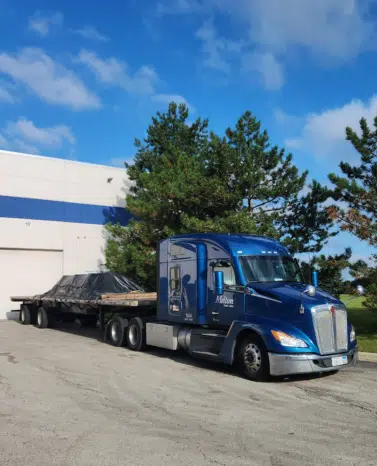
What to Expect When Shipping Flatbed Loads
Flatbed shipping has always been a critical mode of transportation, and the demand for it is only growing in industries like manufacturing, energy, and construction. Flatbed trailers are uniquely versatile and can transport many commodities, but are they suitable for your business? This blog covers what kinds of freight are best shipped with flatbed trailers and what you can expect when utilizing flatbed shipping services.
What is a Flatbed Trailer?
A flatbed trailer is a broad term for any open-deck trailer with no sides or roof. In contrast to dry van trailers, flatbed trailers can be used for any freight that doesn’t require the protection of an enclosed trailer. It’s also utilized for irregularly shaped freight or any commodity that would exceed the standard dimensions of a dry van trailer.
The legal length for flatbed loads is 53′ and the legal weight is 80,000 pounds. However, several types of flatbed trailers are used for different types of freight, including loads that exceed these dimensions. This includes:
- Step Deck Trailers: Used for taller loads that exceed standard height requirements
- Double Drop/Low-Boy Trailers: Used for heavy machinery or other tall/overweight loads
- Conestoga Trailers: Comes with a retractable tarp to avoid needing to manually tarp loads
- Extendable Trailers: Used for freight that exceeds standard length requirements
Benefits of Flatbed Shipping
Flatbed shipping can have several advantages over other modes of transportation depending on the commodities you’re shipping. Here are a few primary benefits:
- Easy Loading/Unloading: Since flatbed trailers are open on all sides, unloading and loading unwieldy freight can be made a lot easier by providing access for cranes and forklifts.
- Versatility: With so many types of flatbed trailers available, this mode of transport is extremely versatile. Even if a load is overweight or oversized, it can still be shipped via flatbed with the proper permits and additional safety measures.
- Fits Into a Larger Supply Chain: If your freight is traveling via many modes of transportation, flatbed trailers can be useful for some legs of the journey. For example, flatbed trailers could move shipping containers from a seaport to a final destination farther inland.

Challenges of Flatbed Shipping
- Load Securement: Since flatbed trailers are completely open, it is up to the driver to properly secure your freight, leaving more room for potential error. At Melton Truck Lines, our drivers are trained from day one to secure a variety of different load types, leaving our customers with peace of mind that their freight will arrive damage-free.
- Exposure to Elements: For commodities that can get damaged with exposure to elements like rain and dust, flatbed shipping does come with some inherent risk. Most flatbed companies will utilize tarps in their securement process to ensure your freight stays protected.
-
Additional Regulations: If your shipment is oversized/overweight, it could require extra permits and safety requirements to be transported legally. Working with an experienced flatbed company like Melton Truck Lines will make sure your cargo is compliant with these laws and makes it to its destination without any delays.
Why Choose Melton Truck Lines for Flatbed Shipping?
Melton Truck Lines has been in the flatbed trucking industry for over 70 years, and our experience allows us to handle any type of shipment you need delivered in a timely, safe manner. Our late-model equipment comes with advanced safety features to prevent any potential delays or damage to your freight, and all of our drivers are trained extensively in important skills like route planning, load securement, and HOS compliance. We offer both standard flatbed and step deck trailers to accommodate a variety of freight.
No matter the cargo, the Melton Truck Lines team is ready to help! Visit our flatbed services page to learn more about us, or submit a rate quote form to see how you can get started.
